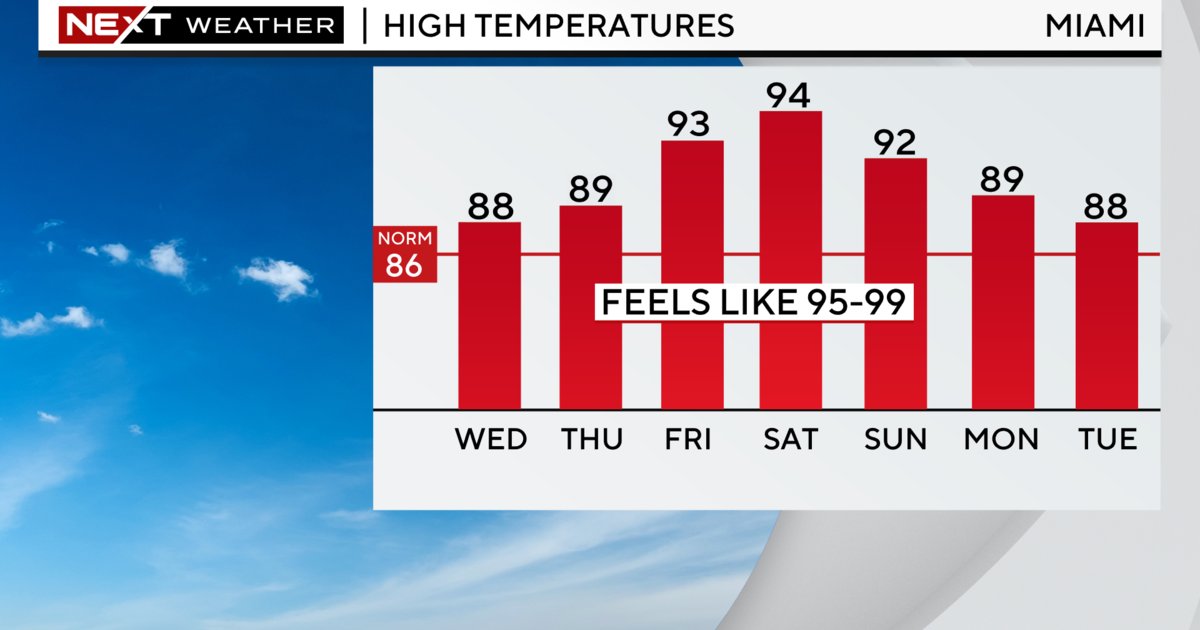Nearly Half Of All Immigration Judges Eligible For Retirement In 2014
MIAMI (CBSMiami/AP) — The nation's immigration court system, already bogged down with a backlog of nearly 350,000 cases, could fall even more behind in in 2014.
That's because nearly half of its 220 judges will be eligible for retirement next year.
The Executive Office for Immigration Review, which oversees the nation's 59 immigration courts, says the court already has 32 vacancies which has contribituted to the problem. Judges are overwhelmed, and immigrants with legitimate asylum claims can spend years in legal limbo.
Meanwhile, immigrants without legitimate legal claims remain in the country, while Americans foot the bill for them to be locked up longer.
The Executive Office says its average retirement rate is only 5 percent per year — which would mean 11 judges retiring in 2014. But Judge Dana Leigh Marks, president of the National Association of Immigration Judges, fears increasingly difficult conditions are likely to push many to retire at the earliest opportunity.
"We are the forgotten stepchild. When Congress wants to fund immigration enforcement, they forget about the court," Marks said.
She said it takes months to vet judicial appointees and even longer for judges to get up to speed.
Congress has aggressively boosted funding for immigration enforcement and detention, with the Obama administration deporting some 360,000 people last year. Yet, the courts have seen few additional resources. That's even as caseloads have jumped 15 percent since 2011, according to Executive Office for Immigration Review Director Juan Osuna, who testified before a congressional subcommittee.
As far back as 2008, a Georgetown Immigration Law Journal article surveying immigration judges found they exhibited more burnout "than prison wardens and physicians in busy hospitals." The judges blamed the stress on the pressure to adjudicate so many cases — and decide the fate of so many lives — in such little time.
Unlike other federal judges, immigration judges fall under the U.S. Department of Justice and are employees of the executive branch, not the judicial branch. Their caseload varies. In Honolulu, two immigration judges currently each have about 100 cases, while six judges in Houston have about 6,000 cases each, according to the nonprofit federal data tracker, Transactional Records Access Clearinghouse at Syracuse University.
Immigration judges have no bailiff, no court reporter and aren't guaranteed a court clerk. And while a federal judge might lean on three law clerks to help with 400 or so complaints, three immigration judges generally split one law clerk for an average of 1,500 cases.
Immigration judges also shoulder a much greater share of the legal research than other judges because 60 percent of those who come before their bench cannot afford an attorney.
Brookings Institute Fellow Russell Wheeler said the delays create additional expense for taxpayers because individuals can spend more time behind bars waiting for their cases to be resolved at a cost of about $160 per night.
Not everyone wants more judges, though. The lag time allows those without legitimate legal claims to remain in the country longer, and some immigrants hope if they can fight deportation long enough, Congress will eventually provide them some form of amnesty. Others marry a U.S. citizen while waiting for their cases to be heard.
Miami immigration attorney Hector Diaz accompanied his client to immigration court this month in Miami. The client, who is in the country illegally, is fighting a deportation order he received after he was stopped for driving with an expired license.
Diaz argues his client's removal would cause extreme hardship for the man's mother, a U.S. citizen, but Diaz acknowledges it's a tough case to win.
"So it does benefit them to have the cases pushed back," he said.
Judge Marks said while some benefit from the delays, it's often those with the strongest cases who lose out because memories fade and witnesses supporting their case become less reliable or available over time.
The Senate passed immigration legislation in June that allocates more money for the immigration courts and called for 225 new judges, as well as an equal number of support staff, over the next three years. But House Speaker John Boehner has said his chamber will not take up that bill nor address a similar one introduced by House Democrats.
The president's 2014 budget calls for 30 new immigration judge teams to address the backlog as well as other efforts to help the courts, but the stalemate in Congress makes it less likely the improvements will happen.
Immigration attorney Ira Kurzban, author of the industry standard, "Kurzban' s Immigration Law Sourcebook," said while many in Congress complain about deportation proceedings, they have failed to provide the necessary resources for sufficient judges to allow the system to function properly.
"Doing so would allow those people who should be here legally to get their legal status, and those who have no legal claim to be here would presumably be deported," he said.
(TM and © Copyright 2013 CBS Radio Inc. and its relevant subsidiaries. CBS RADIO and EYE Logo TM and Copyright 2013 CBS Broadcasting Inc. Used under license. All Rights Reserved. This material may not be published, broadcast, rewritten, or redistributed. The Associated Press contributed to this report.)



